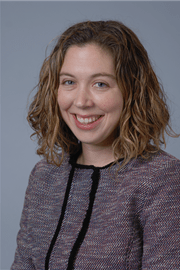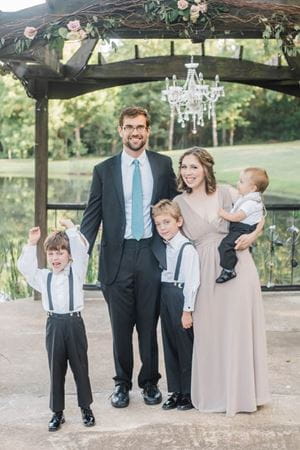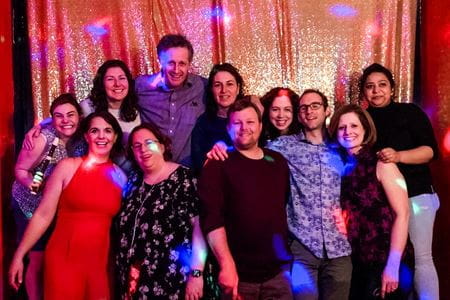(Pictured right: Sims and her colleagues enjoying a night off at a karaoke lounge)
Emily K. Sims, MD, has been appointed the assistant director of faculty development and translational research within the Herman B Wells Center for Pediatric Research.
In this role, Sims is responsible for supporting faculty and trainee development, enhancing processes and visibility of resources related to translational research, and aligning and overseeing the translational aspect of the Wells Center in partnership with her clinical and funding counterparts at in the Department of Pediatrics, Riley Children’s Foundation, IU Health and others.
“A key focus of our work at the Wells Center is to translate our research findings into new or improved clinical approaches and practices for pediatric disease.” said Wells Center Director Reuben Kapur, PhD. “Dr. Sims has a track record of passion and leadership for this aspect of our mission. She will be an outstanding advocate for our faculty and trainees.”
 Sims is an associate professor in the Indiana University School of Medicine Department of Pediatrics and a pediatric endocrinologist at Riley Hospital for Children at IU Health. She obtained a medical degree from the University of Alabama and completed her medical and research training at IU. Today, she is an NIH-funded investigator in the Pediatric Diabetes program at the Wells Center and the Center for Diabetes and Metabolic Diseases.
Sims is an associate professor in the Indiana University School of Medicine Department of Pediatrics and a pediatric endocrinologist at Riley Hospital for Children at IU Health. She obtained a medical degree from the University of Alabama and completed her medical and research training at IU. Today, she is an NIH-funded investigator in the Pediatric Diabetes program at the Wells Center and the Center for Diabetes and Metabolic Diseases.
Kapur said that Sims’ work in both the basic science and clinical studies has given her a unique zeal and perspective on bridging laboratory science with clinical practice. Her research focuses on mechanisms that contribute to the development and progression of Type 1 diabetes.
In fact, together with the pediatric diabetes research group at the Wells Center, Sims has identified several biomarkers that assess a person’s risk for Type 1 diabetes. Recently, her work with the TrialNET network has led to breakthrough clinical studies showing that disease-modifying therapy can improve metabolic function and successfully delay the onset of Type 1 diabetes in high-risk people for almost 3 years.
In her new role, Sims said that she hopes to help her colleagues navigate the many resources available for translating research while also emphasizing the importance of work-life balance--especially if that means enjoying a karaoke break every once in a while:
What do you hope to accomplish in your role as assistant director of faculty development and translational research?
Before I started working in my mentor’s basic science laboratory, I felt incredibly overwhelmed by basic science, like that world was totally inaccessible to me. However, I found out that once I was able to get some practical guidance from people who had a lot of experience with molecular biology, and with the resources available at IU, I was able to eventually really grow my molecular toolkit. I hope that I can provide that same guidance for people who have had a translational idea brewing for a while but are just not sure where to start or have a hard time coming up with practical ideas to bridge that gap to humans.
When it comes to professional development, what is the number one thing that you recommend to early career scientists?
One thing that has been really key for me, in addition to working hard, is figuring out how to work smart. There is so much to do in our jobs- it is really important to be efficient and as organized as possible. Also to do the best you can to figure out the pieces in your work and personal life that are nonnegotiables/really important versus the things that are probably OK to let slide a little, say no to, or delegate.
As a physician scientist, how has your clinical work affected your laboratory research and vice versa?
For me these have both been critical for each other. I love that clinic provides perspective for the research that I am doing (both when things go wrong and when things go right). And I love that when I see patients with diabetes, I can tell them all of the exciting things that are on the horizon for diabetes care- because I know firsthand from our group’s research. Also, definitely observations from clinical care have informed the way I think about research questions. And at IU we have been very lucky to have to opportunity to translate findings from researchers at the bench at IU and elsewhere to clinical trials that are testing new therapeutic agents to treat and prevent T1D.

When you’re not at work, how do you like to spend your time?
I have 3 little boys so probably most of my free time I am corralling kiddos. But I have also gotten really into exercise (always try to make time for this!) and since the pandemic has been improving, I am relishing the opportunities to socialize in person with our grown-up friends!
Ok. Last question. We heard you like karaoke. What’s your go-to song?
This is actually probably the hardest question of the bunch! This depends on your mood and is critical to read the room :). But Just Like a Prayer (Madonna) is definitely a go-to favorite!
